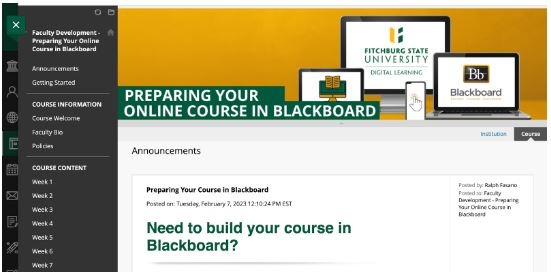Access and integrate your academic department’s preferred Blackboard course template
Many academic departments have a preferred blackboard course template that can be easily leveraged to develop new courses quickly or to migrate into previously built courses.
Preferred course templates promote consistent course design principles and facilitation best practices while enabling faculty the flexibility to innovate and customize their course experience.
Resources for Students
The templates include the following student resources:
- Embedded Library Support
- Tutoring Center
- Writing Center
- APA Resources
- Counseling Services
- Health Services
- Career Services
- Disability services
- Turnitin Support
- Student Blackboard Support
Resources For Faculty
A unique feature of every course template is the inclusion of Blackboard support video tutorials embedded throughout the course. These videos support faculty on how to use the template and other frequently used Blackboard functions; for example, how to create discussion groups, and how to configure the grade center.
To access and integrate your academic department's blackboard course template contact your department chair or the Director of Digital Learning, Ralph Fasano at rfasano@fitchburgstate.edu.
